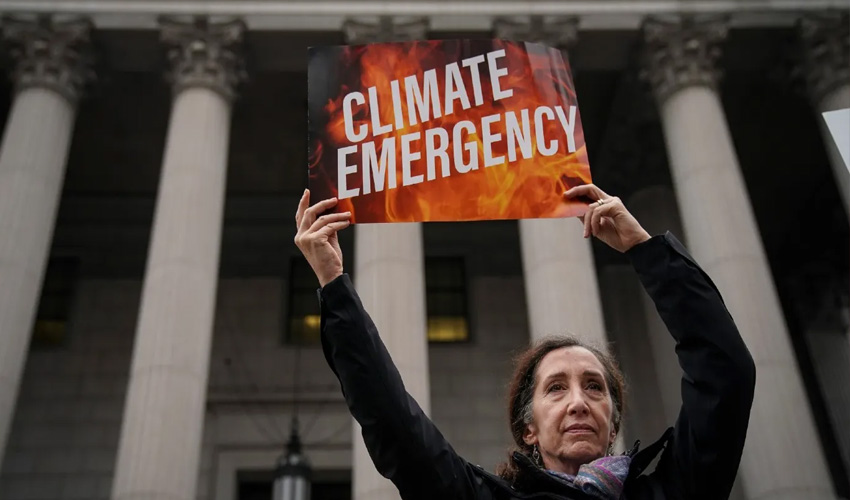The United States stands at a crossroads in the run-up to the 2024 presidential election over its climate policy. With wildfires driving masses to evacuate, hurricanes that have devastated entire cities, and heat waves scorching the Southwest, the effects of climate change are no longer some abstract threat-they are very real headlines that have taken hundreds of lives and imposed financial costs topping $150 billion annually.
At this critical inflexion point, voters will have to decide between two starkly opposing visions-one that would lock in further bold climate action and another that would sharply roll back the federal protections for the environment.
Tale of two candidates
Of course, it is Vice President Kamala Harris, who has vowed to build on and strengthen the climate work of President Joe Biden and his administration. The Biden-Harris administration has taken steps unprecedented in dealing with the climate crisis, foremost being the IRA, into its last four years.
According to this legislation to which Harris lent her tiebreaking vote, a decade would see investments of $369 billion to drastically cut greenhouse gas emissions. Harris has termed clear air and water as a central issue and vowed that all Americans are worthy of protection from pollution fuels climate change.
On the other hand, we have former President Donald Trump-an absolute climate antagonist. He rolled back over 200 environmental regulations during his rule and even appointed Supreme Court justices that watered down existing key protections. In the Heritage Foundation's Project 2025, Trump's vision of a second term is starkly pro-fossil fuel-where he maintains his goal to extricate maximum oil and gas extraction and dismantles most of the government's climate science capabilities.
He once claimed that climate change is "not our problem," in utter disregard of the fact that the U.S. is the biggest historical contributor to global warming.
Climate policies: Past and future
Comparing the environmental record of Trump, the Biden-Harris administration stands in a league of its own. The IRA, together with the Bipartisan Infrastructure Law, marks a new course for US energy policy and pivots to renewable energy along with EV adoption.
These efforts have led to this unprecedented level of electric vehicle sales and investment in clean energy technologies. Even as these changes generate more questions than answers regarding the future of U.S. energy policy under Harris, fossil fuel production has increased too.
While Harris has declared a need for a better-balanced energy policy, she has not forbidden fracking effectively. Trump, on the other hand, vowed that his administration would prioritize fossil fuel extraction above all else and promised to "drill, drill, drill" on day one of his presidency. The Energy Innovation Energy Policy Simulator conveys some of the potential effects of a Trump presidency: repression of progress made to date in reducing emissions and loss of opportunities for clean energy manufacturing in the U.S. forever.
Imperative of disaster preparedness
Whichever wins the election, the next president will face the ripples that the climate change impact will be putting on an already challenged world. Hurricanes, floods, and heat waves are among various kinds of disasters that will continue to rise and intensify. Climate resilience has been on the agenda for the Biden-Harris administration: launching building code improvement efforts while distributing funds to help communities resile against disasters. Meanwhile, the proposed Project 2025 plan would gut funding for disaster responses and chop deeply into the National Flood Insurance Program, a vital lifeline for most Americans who face the threat of flood conditions.
Even more, past actions and choices by Trump show the possibility that his government will not act appropriately during disasters. For example, it is believed that he delayed the issue of disaster relief to regions devastated by wildfires in California until political loyalty evidence was shown. Such a move constitutes a dangerous policy when it comes to dealing with climate-induced disasters because it usually focuses on specific vulnerable groups.
The choice Is clear
To advocates and experts in climate, the message this election has just shown is blunt in no better way. Every year matters. Every ton [of CO2] matters. Every action matters." The fate of U.S. climate policy will depend on the voters and their defining decision: back an agenda that has bet on strong climate action and resilience or return to a past defined by deregulation and inaction.
As the 2024 presidential election draws closer, it is crucial for voters to understand that the drastic implications of their choices will have a lasting impact on not just politics, but survival for many communities and the environment as a whole. It is high time for decisive action.



























